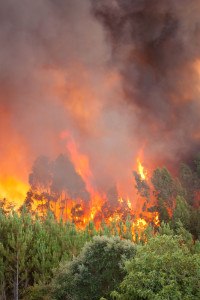Interior Secretary Ryan Zinke on Tuesday directed all land managers and park superintendents to be more aggressive in cutting down small trees and underbrush to prevent wildfires as the smoke-choked West faces one of the worst fire seasons in a decade.
In a memo, Zinke said the Trump administration will take a new approach and work proactively to prevent fires “through aggressive and scientific fuels reduction management” to save lives, homes and wildlife habitat.
Wildfires are chewing across dried-out Western forests and grassland. To date, 47,700 wildfires have burned more than 8 million acres across the country, with much of the devastation in California, Oregon and Montana, Zinke said.
As of Tuesday, 62 large fires were burning across nine Western states, with 20 fires in Montana and 17 in Oregon, according to the National Interagency Fire Center. Nearly half the large fires in the West reported zero acreage gains on Monday, helping firefighters across the West make progress toward containing them, the agency said.
The Forest Service and Interior Department have spent more $2.1 billion so far this year fighting fires – about the same as in all of 2015, the most expensive wildfire season on record.
Those figures do not include individual state spending. In Montana, where more than 90 percent of the state is in drought, the state has spent more than $50 million on fire suppression since June, with fires likely to burn well into the fall.
Oregon has spent $28 million, but expects to be reimbursed for part of that by the federal government and others.
 Exacerbated by drought and thick vegetation, wildfires are “more damaging, more costly and threaten the safety and security of both the public and firefighters,” Zinke said. “I have heard this described as ‘a new normal.’ It is unacceptable that we should be satisfied with the status quo.”
Exacerbated by drought and thick vegetation, wildfires are “more damaging, more costly and threaten the safety and security of both the public and firefighters,” Zinke said. “I have heard this described as ‘a new normal.’ It is unacceptable that we should be satisfied with the status quo.”
Zinke’s memo did not call for new spending, but he said federal officials “must be innovative” and use all tools available to prevent and fight fires. “Where new authorities are needed,” he added, “we will work with our colleagues in Congress to craft management solutions that will benefit our public lands for generations to come.”
The Interior Department oversees more than 500 million acres supervised by the Bureau of Land Management, National Park Service, Fish and Wildlife Service and other agencies. The Forest Service, a unit of the Agriculture Department, is the nation’s largest firefighting agency, with more than half its budget devoted to wildfires.
Agriculture Secretary Sonny Perdue and Western lawmakers have complained that the current funding mechanism – tied to 10-year averages for wildfire – makes it hard to budget for wildfires, even as fires burn longer and hotter each year.
“I believe that we have the right processes and the right procedures of attacking and fighting fires,” Perdue said in a speech last week. “But if you don’t have the resources and the means of dependable funding, that’s an issue.”
Perdue called on Congress “to fix the fire-borrowing problem once and for all” so that officials are not repeatedly forced to tap money meant for prevention programs to fight wildfires.
“Fires will always be with us. But when we leave a fuel load out there because we have not been able to get to it because of a lack of funding, or dependable funding, we’re asking for trouble,” Perdue said.
“If we don’t start managing our forests, the forests are going to start managing us,” said Sen. Steve Daines, R-Mont. “The fires burning across Montana are a catastrophe, and we need all available resources to combat this threat.”
Was this article valuable?
Here are more articles you may enjoy.

 One out of 10 Cars Sold in Europe Is Now Made by a Chinese Brand
One out of 10 Cars Sold in Europe Is Now Made by a Chinese Brand  LA County Told to Pause $4B in Abuse Payouts as DA Probes Fraud Claims
LA County Told to Pause $4B in Abuse Payouts as DA Probes Fraud Claims  Portugal Rolls Out $2.9 Billion Aid as Deadly Flooding Spreads
Portugal Rolls Out $2.9 Billion Aid as Deadly Flooding Spreads  UBS Top Executives to Appear at Senate Hearing on Credit Suisse Nazi Accounts
UBS Top Executives to Appear at Senate Hearing on Credit Suisse Nazi Accounts 